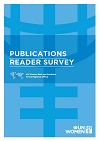
Publications Reader Survey Report, 2019

UN Women East and Southern Africa Knowledge Management Strategy (2018-2021) provides for a biennial Publications Reader Survey to understand and appreciate the publications commonly sought by stakeholders of UN Women in the entire region. This survey also analysed what form of publications are being sought by diverse audiences and how often the publications are consulted by the audiences. It further mapped which parties seek UN Women publications in the region and in what format they preferred whether electronic or hard copies, accessibility for development and, policy-making (particularly in East and Southern Africa) and ways UN Women ESAR could improve on the presentation of their publications to accelerate demand by diverse stakeholders. Through this publications’ reader survey, the region has ensured continuous improvement of the user-friendliness, practicality and overall quality of UN Women’s publications. This is the second survey following the first reader survey conducted in 2015 which confirmed that UN Women publications are widely useful to diverse audience. The survey targeted the UN agencies (13.9 per cent), NGOs and CSOs (26.6 per cent), policy makers (8.8 per cent), development agencies, private sector agencies (7.6 per cent), regional economic communities (2.5 per cent), academic institutions (26.6 per cent) and individual gender equality advocates (12.7 per cent) and the rest from the media and others. The analysis revealed that UN Women publications are readable and positions gender equality and women’s empowerment as a core principle of development. For this reader survey, diverse questions were included in the survey to comprehend the use and review of UN Women East and Southern Africa regional publications. A brief and user-friendly online questionnaire was disseminated to all UN Women stakeholders in the region complimented with key informant interviews and telephone conversations. The total number of responses to the questionnaire was 243 comprising 57 per cent female and 43 per cent male. The results indicate that the readers have rated the publications positively, with over 80 per cent confirming that over the past three years, the quality of UN Women publications have improved. Over 88 per cent further showed confidence in UN Women publications noting that the publications have been very useful to them. In conclusion, UN Women Publications have a wide range of access and utilization with potential scalability benefits.